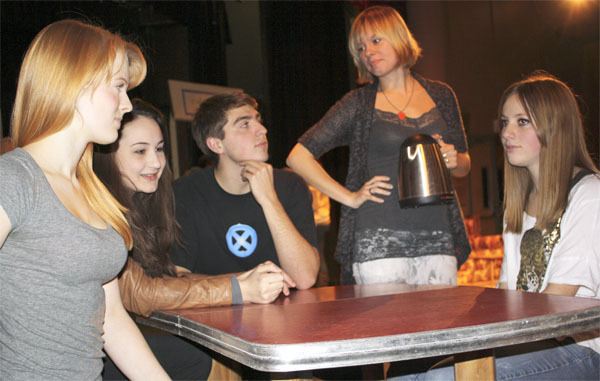Fences. Where I grew up, fences were built neither for decoration nor for making good neighbors. Fences were utilitarian constructs, there for keeping the critters in and, in the olden days, the rustlers out — those bad guys who could slip in in the dark of night and steal away your assets and your security.
Last weekend I attended Vashon High School’s production of “The Laramie Project” and was struck by the fact that both the program and the set were dominated by the image of a fence eerily reminiscent of those on my family’s ranch. It was a benign, almost romantic photograph, central to the set and reprised as a sketch on the program cover. But this was no romantic fence, and certainly not benign. This was a fence representative of a horrific event — a fence that failed to keep anything good in or anything bad out. This fence served famously as a hitching post for hatred.
“The Laramie Project” is a learning opportunity for every person who thinks he or she has a handle on the gay-bashing issue — a teachable moment for those who live in the cocoon of a “live and let live” community like Vashon Island, as well as those who still refer to homosexuality as a lifestyle.
“Anytime you call someone a fag, … that is the seed of violence.” The script is composed of quotes from interviews with the citizens of Laramie, Wyo. It’s a reluctant accounting of the murderous actions of two of their children, kids who decided one night to teach a “fag” a lesson after they tied him to that fence.
Ultimately, those kids taught the whole world a lesson, that for all the posturing about communities being mostly comprised of “good people,” the greater fact remains that societal and religious forces still grant people quiet license to abuse one segment of humanity. That license is made manifest in the words of too many “good people” portrayed throughout the play. “It’s tough business to be gay in cowboy country.” Chuckle, chuckle. Translation: He was warned. What did he expect?
Matthew Shepherd made Laramie famous. The townspeople hated it when his murder in 1998 became their identity. They resisted these interviews. “I hope, when you think of this town, you can see something besides a crime.” But what of Matthew Shepherd, forever known as just a kid who was murdered because he was gay? “Matthew Shepherd was just a name, not an individual.” Both town and victim are frozen clichés, both forever stripped of their dignity and humanity.
“Hate is not a Laramie value.” I grew up in a rural community not dissimilar to Laramie, surrounded by well-meaning folks who believed in the Bible and aimed to do what was right in this life. Hate was not a value there, either. But my gay cousin didn’t dare come out until he’d left the ranch and lived on the other side of the country. Even then, when he finally confessed his sexual orientation to his family, several of his passionately Christian siblings let him know he would never be forgiven.
“As the parade came down the street … the number of people marching for Matthew Shepard had grown, like, five times.” Lots of wonderful people march in the “live and let live parade” but when the floats are put away and the Bibles come out, what are they teaching their children? How many queer jokes are told? Hating the sin isn’t just a hair’s breadth from hating the sinner; calling it a sin is a passively hateful act. One person said he thought the motivation wasn’t religion but machismo. So, exactly which lessons raised those macho boys?
Homophobia descends insidiously through generations, unintentionally or otherwise. It’s the kind of hate that has a half-life. Each time a homophobic law or tenet is overturned, we imagine the communal landscape is safe for our gay cousins. Then a toxic event snaps our communities back to reality. “We are like this. We ARE like this. We are LIKE this.” Are we really? Still?
Kudos to these courageous teens at VHS who could have chosen to do another comedy but chose instead to confront ugly truths. Honor them by seeing this play.
— Rebecca Wittman is a freelance writer living on Vashon.
“The Laramie Project’ will be performed at 7:30 p.m. Friday and Saturday and 2 p.m. Sunday at Vashon High School. The matinee will benefit Vashon Youth & Family Services’ programs serving lesbian, gay, bisexual and transgender young people and will include a panel discussion with cast members, VYFS staffers and the community. Tickets, available at the door or at VHS, are $5, with an additional donation requested for VYFS at the matinee.



